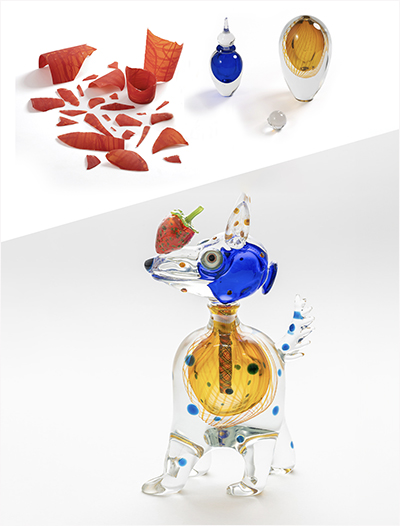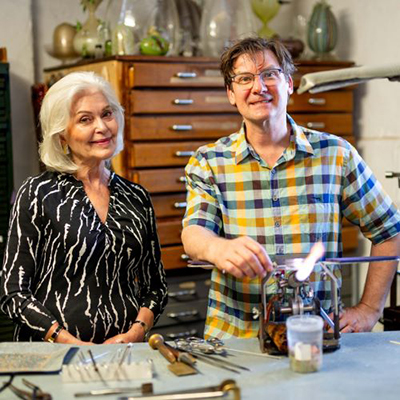Beloved but broken items given new life in unique arts project
By Melissa Keogh
A cracked early 20th century teapot and torn silk souvenir scarf from the 1956 Melbourne Olympic Games are among a collection of treasured items restored as part of an innovative arts project illustrating the importance of reuse and repair.
More than a dozen designers, artists and craftspeople are working to repair a collection of beloved items, each cherished by their owners, who will witness the possessions undergo remarkable transformations.
The Transformative Repair project is led by UniSA Enterprise Fellow Dr Guy Keulemans, and designer Dr Trent Jansen of UNSW in partnership with craft and design institution JamFactory.
 Before and after: A broken vase and perfume bottles owned by Paula Nagel AM have been given new life by glass artist Tom Moore.
Before and after: A broken vase and perfume bottles owned by Paula Nagel AM have been given new life by glass artist Tom Moore.Dr Keulemans, a member of UniSA’s Creative People, Products and Places Research Centre (CP3), specialises in sustainable craft and design, specifically new forms of repair and reuse as part of the broader field of circular economy.
Circular economy is a production and consumption model that involves reusing, repairing, refurbishing or recycling existing materials and products to promote long-term sustainability.
“Every year in Australia we produce about 70 megatons of waste – that’s nearly 500 Sydney Opera Houses – in volume, and the waste of household goods is a sizeable portion of that,” Dr Keulemans says.
“Transformative Repair responds to this waste crisis by seeking to find new ways that designers can tackle repair and reuse in their practice, as a service so that clients and customers have more options for prolonging the life of their goods and possessions.
“We have all sorts of objects, ranging from 19th century antique teapots to mid-20th century furniture, jewellery and more. There’s about 12 designers and craftspeople involved in the exhibition and they’re tackling the transformative repair in different ways. For some designers it’s a challenging yet simple process of repair and for other designers they’re really transforming the object, perhaps giving it a new function, a completely new appearance or a new style.”
Among the treasured objects is a well-loved Luis Vuitton bag, frayed necklaces designed by local jewellery designer, the late Alice Potter, a broken Khai Liew chair, a timber knitting table, a cumulus light, an old hammer, damaged audio speakers, and various “stuff from a shed”.
 Paula Nagel and Tom Moore in the artist’s studio.
Paula Nagel and Tom Moore in the artist’s studio.Some of the broken items belong to broadcaster and author Paula Nagel AM, the first female reporter on ABC’s current affairs program This Day Tonight in the 1960s.
Nagel owns a handful of red glass shards that once made up a vase she accidentally knocked from its perch and onto the floor in her home. The former JamFactory board member is a collector of glass figurines and delicate works of art.
The broken glass pieces as well as two damaged perfume bottles have been recreated into an entirely new artwork by specialist glass blower Dr Tom Moore.
He has dedicated his life to glass artistry and in 2019 attained a PhD at UniSA, specialising in hot glass sculpture. Dr Moore, who is known for his humorous and fantastical creations, will transform the broken glass shards and perfume bottles into a quirky figurine of a dog.
“I think the value in this project is getting people to think about objects and what they mean to people,” he says. “I wanted to do this project to make something funny. It’s absurd what I’m planning to do. It doesn’t make sense and that’s the value of it. I think it will shine some kind of light on what objects mean to people.”
JamFactory CEO Brian Parkes says the arts institution has enjoyed a long association with UniSA and appreciates the chance to engage in projects with an investigative focus.
“The opportunity to have a research lens over some of these activities, engage in some reflective learning and receive feedback on how me might do things and improve in the future is a great privilege,” he says.
The renewed creations are being showcased at Adelaide’s JamFactory in April. It is the second iteration of the Transformative Repair project, the first being in 2022 when a collection of old or damaged items – including a dented, fire-engine red Vespa scooter belonging to actor Yael Stone – were given a new lease on life and auctioned at the Australian Design Centre in Sydney.
The project is funded by the Australian Research Council’s Linkage Projects scheme.
Transformative Repair is showing at JamFactory until 21 April. Visit the website for more information.
Other Stories
- Young African students call out racial stereotypes in TikTok first
- Beloved but broken items given new life in unique arts project
- Targeted liver cancer treatment kills cancer cells and cuts chemo side effects
- Think $5.50 is too much for a flat white? Actually it’s too cheap, and our world-famous cafes are paying the price
- From the Vice Chancellor: In motion
- Achievements and Announcements
- ‘Mud wizard’ shares their Aboriginal Pathway Program success story
- Who knew that eating poo was so vital for birds’ survival?
- In Pictures: April graduation ceremonies
- The latest books from UniSA researchers




